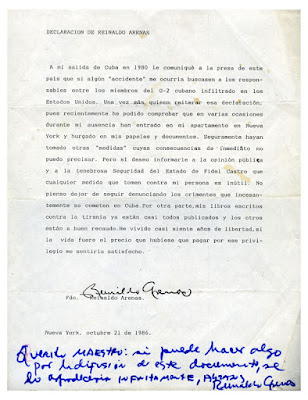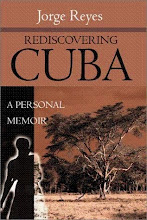End the Cuban Embargo

by Jorge Reyes
I have been thinking a lot lately about the U.S.-led Cuban embargo and its ability, real or perceived, ultimately to bring about a democratically elected government in Cuba. In my most recent book, a personal memoir that included a visit to Cuba, I hardly touched on the subject. At the time I was writing it I didn't think politics was as important as the personal drama I sought to analyze.
However, since then, many things have occurred that have brought the entire dialogue of Cuba to the forefront (yes, I'm thinking of the Elián soap opera), causing me to change my own personal opinions. Prior to that time, my thoughts were not unlike what the vast majority of Cubans in exile think: With an embargo, Fidel will be history.
I left Cuba when I was 8 years old. Up until my visit, I thought very little of my country. I was too taken by my new adopted nation -- by everything it gave me, by all the opportunities I had. Cuba, to my way of knowing, was a backward nation with a repressive form of government that stifled aspirations, hope and even happiness. The few times I thought about Cuba, I only thought about the bad things: having my hair forcefully trimmed at my elementary school; actos de repudios -- acts of repudiation; the hardships; the hunger.
 Why, I thought to myself, would anyone want to go back and visit?
Why, I thought to myself, would anyone want to go back and visit?As I grew older, my ideas matured, and my memories became laced with childhood nostalgia. It was Ernest Hemingway who said that memory is hunger. I often heard about the old house in the town in Boniato near the city of Santiago de Cuba. I often heard about my grandmother, now old, with cottony white hair and a face full of wrinkles, who every afternoon sat in the corridor of the house dressed in white cotton petticoats she still made by hand. She often asked any visitors from Miami about me, about my mother, about her other family members whom she hadn't seen in more than 20, then 30 years.
These thoughts, plus the terminal illness that finally consumed my grandmother, prompted me finally to ask my mother and an aunt to go back. They -- especially my mother -- had trepidations about going to Cuba. What were they going to find? What were they expecting to find?
We left Miami on a Friday afternoon and arrived in Boniato at the crack of dawn on Saturday. It took us almost 12 hours to arrive in a country that's only 45 minutes away. By the time we got to our hometown, the three of us were already tired, seeing our country as if in a dream. Cars, buses and horse-drawn carriages made up the traffic of Santiago at that hour.
The people seemed to live under circumstances that were, well, less than favorable. Homes had electricity, but blackouts underscored the strange realities of the peoples' existence. When there was light, it was so faint that everything took on a surreal pale glow that was nothing less than creepy.
Buses were filled to capacity, and the people on the buses usually hung from doors and windows, clinging desperately to each other by the hem of shirts or pants, whatever.
I devoted a very brief chapter to politics in my book. As I said, politics wasn't as important to me as the personal drama I sought to rediscover. And yet the tragedy of the Cuban people as a whole and Cuba's experiment in communism, or Fidelism, cannot be separated -- complex as it may be, sad as it is -- from political undertones.
It was then, on my trip to back, seeing this disaster all about me, that my ideas about Cuba began to change, and quick. The U.S. embargo hurts the people, not those in power. If the ultimate purpose of the embargo is to defeat Fidel by isolating him economically, socially and politically, it has failed in both rhetoric and in practice.
Fidel, 49 years after his revolution, is still there, old and on the brink of death, but he's still there nonetheless using the embargo for his own purposes!
 This, to me, is reason enough to scrap this relic of the Cold War and come up with something better., And this should be done not because of Cuban politics but in spite of Fidelism and in spite, even, of the ire this view draws among many well-intentioned Cuban Americans in Miami. Further isolation makes no sense when the time is ripe to bombard Cuba with commerce, information and an influx of new ideas.
This, to me, is reason enough to scrap this relic of the Cold War and come up with something better., And this should be done not because of Cuban politics but in spite of Fidelism and in spite, even, of the ire this view draws among many well-intentioned Cuban Americans in Miami. Further isolation makes no sense when the time is ripe to bombard Cuba with commerce, information and an influx of new ideas.I often heard about my grandmother, now old, with cottony white hair and a face full of wrinkles.
All those who with Janus-like face only can look at an either-or situation miss the complexities of the Cuban nation and the countless, slow ways it will eventually turn into a pluralistic, multi-party political system.
I may be naive about my opinions. What I do know, though, is that there is a lot of work to be done in a post-Castro Cuba. The realities of that future demand new, fresh, imaginative ways to bring about a peaceful reconciliation among Cubans.
I don't have all the answers. What I do have is an open mind. Now is the time, more than ever, to breach this gap and cross that 90-mile stretch that to some of us is as wide as the universe. So I wrote in the book: "Go and visit an uncle. An aunt. A grandmother. Honor your past. Crack that barrier that exists. Rediscover yourself. The Cuba of tomorrow belongs to all of us.''
My parents lost Cuba once. Don't let it happen again with this generation.
REDISCOVERING CUBA






